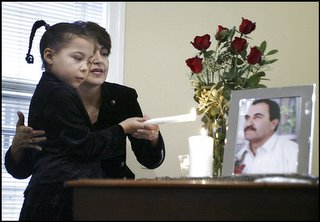Washington Post Staff Writer
Monday, January 30, 2006; Page B03
-------------------------------------------------
For 10 years, Dhabihu'llah Mahrami remained in an Iranian jail when a simple declaration would have freed him: "I am not a Bahai."
"That's all he had to say," Ali Afnan, an Iran native and Bahai follower, told about 60 members of the faith who gathered yesterday to remember Mahrami at a service held at the D.C. Baha'i Center on 16th Street NW.
Mahrami, a follower of the Bahai faith, Iran's largest non-Muslim minority religion, died of unknown causes in a prison in central Iran last month, prompting renewed concerns over the persecution that Bahais have faced in Iran since the religion was founded there 150 years ago.
 A former Iranian civil servant, Mahrami, 59, was sentenced to death by an Islamic revolutionary court in 1996 for returning to Bahai after allegedly converting to Islam. Mahrami said that he had never left the Bahai faith and that sympathetic Muslim co-workers had said he converted to Islam so he wouldn't lose his government job. His sentence was later commuted to life in prison.
A former Iranian civil servant, Mahrami, 59, was sentenced to death by an Islamic revolutionary court in 1996 for returning to Bahai after allegedly converting to Islam. Mahrami said that he had never left the Bahai faith and that sympathetic Muslim co-workers had said he converted to Islam so he wouldn't lose his government job. His sentence was later commuted to life in prison.Members of the faith, which claims about 5 million followers worldwide, say he would have been free to return to his job, wife and four children if he had renounced Bahai (pronounced Bah-Hay).
Instead, he repeatedly refused.
"Do you think he didn't care about his children?" Afnan, a chemist who lives in Olney, asked the gathering. "Do you think he was above that? No. He did this for love, which makes the world go around."
Leaders of the religion, which is headquartered in Israel, have declared Mahrami a martyr, and his death has raised concerns about an upsurge in persecution against minority religions in Iran.
"Unfortunately, Mr. Mahrami's incarceration is not unique," Adam Erli, deputy spokesman for the U.S. State Department, said in a statement following Mahrami's Dec. 15 death. "Members of the country's religious minorities -- including Sunni Muslims, Sufis, Zoroastrians, Jews, and Christians -- are frequently imprisoned, harassed, and intimidated based on their religious beliefs."
Bahai community members warn that the persecution may rise under the leadership of President Mahmoud Ahmadinejad, who took office in August. A former hard-line Tehran mayor, Ahmadinejad has signaled a desire to return Iran to the conservative zeal that marked Ayatollah Khomeini's 1979 revolution.
The Iranian government has been silent on Mahrami's death, and calls to Iranian officials in the United States were not returned yesterday.
Since 1979, more than 200 Iranian Bahais have been killed and hundreds more imprisoned by the Iranian government, Bahai officials say. Many also have had their property confiscated and been deprived of jobs, pensions and education, followers say.
There are about 150,000 Bahais in the United States, including 2,000 in the Washington area.
At yesterday's memorial, a little girl lighted a candle next to a picture of Mahrami while a man strummed traditional Persian music on a santur.
Members of the audience then rose and read prayers from the Kitab-i-aqdas, the religion's most sacred text.
The religion was founded in 1844 by Baha'u'llah, a Shiite merchant who claimed to have had a divine revelation from God. The monotheistic religion teaches "progressive revelation," the idea that Abraham, Moses, Jesus, Muhammad and Baha'u'llah were all messengers from God and that more will come. The religion teaches racial unity and forbids proselytizing. Bahais believe that people must find the faith through their own investigation.
Since its founding, the faith has struggled to find acceptance in strict Islamic countries. Islam teaches that Muhammad is the final prophet.
Some at the gathering had not heard of Mahrami before his death but were inspired by his story.
"We all hope we can rise to the challenge, and here is a man who did," said Patrick Sanders, a lawyer from the District who grew up Catholic but converted to Bahaism about 10 years ago while a college student in Texas. "So I'm here to honor his courage and his faith."
For some, Mahrami's story was deeply and painfully reminiscent of their own.
Jamshid Firouzi's father and brother, who were community leaders of the faith in Iran, were executed shortly after the revolution, he said. In 1983, he, too, was jailed on suspicion of talking to a Zionist reporter and spying for Israel, an accusation faced by many Bahais because of the religion's headquarters in Israel. He spent 10 months in prison awaiting trial, and then, while free on bail, fled the country with his family, he said.
"At the beginning, during interrogations, I was asked if I wanted to remain Bahai," said Firouzi, 49, who lives in Greenbelt. "I said yes."
He said he was never tortured but saw other prisoners taken away for that purpose.
He said Mahrami's death brought back painful memories of the struggles that his family and many of his friends experienced.
"It reminds me of all the innocent people who have been killed," he said.
-------------------------------------------------------------------------
Este artigo foi publicado hoje no Washington Post
-------------------------------------------------------------------------
Sem comentários:
Enviar um comentário